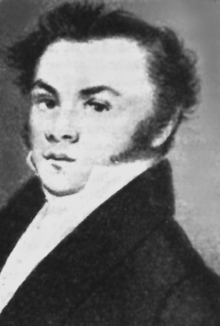bio.wikisort.org - Researcher
Karl Eduard von Eichwald (Russian: Эдуард Иванович Эйхвальд, Eduard Ivanovich Eykhvald; 4 July 1795, in Mitau, Courland Governorate – 10 November 1876, in Saint Petersburg) was a Baltic German geologist, physician, and naturalist, who worked in Russia.
Karl Eichwald | |
|---|---|
 | |
| Born | 4 July 1795 Jelgava (German: Mitau), present-day Latvia |
| Died | 10 November 1876 (aged 81) St. Petersburg, Russia |
| Nationality | Baltic German |
| Citizenship | Russian Empire |
| Known for | Describing new reptile species |
| Scientific career | |
| Fields | Geology Medicine |
| Institutions | Kazan University, Vilnius University, St. Petersburg University |
| Author abbrev. (botany) | Eichw. |
Career
Eichwald was a Baltic German born at Mitau in Courland Governorate. He became a doctor of medicine and professor of zoology in Kazan in 1823; four years later professor of zoology and comparative anatomy at Vilnius; in 1838 professor of zoology, mineralogy and medicine at St. Petersburg; and finally, professor of palaeontology in the institute of mines in that city.
He travelled much in the Russian Empire, and was a keen observer of its natural history and geology. He died at St. Petersburg.
Eichwald was a supporter of Darwinism.[1]
Works
His published works include Reise auf dem Caspischen Meere und in den Caucasus, 2 vols. (Stuttgart and Tübingen, 1834-1838); Die Urwelt Russlands (St Petersburg, 1840-1845); Le Lethaea Rossica, ou Paléontologie de la Russie, 3 vols. (Stuttgart, 1852-1868), with Atlases.
In the scientific field of herpetology he described several new species of reptiles.[2]
See also
- List of Baltic German scientists
Notes
- Corsi, Pietro. (2005). Before Darwin: Transformist Concepts in European Natural History. Journal of the History of Biology 38: 67-83.
- The Reptile Database. www.reptile-database.org.
- International Plant Names Index. Eichw.
References
- Chisholm, Hugh, ed. (1911). . Encyclopædia Britannica (11th ed.). Cambridge University Press.
External links
- Rulex.ru: Biography of Karl Eichwald—(in Russian)
На других языках
- [en] Karl Eichwald
[ru] Эйхвальд, Эдуард Иванович
Эдуард Иванович Эйхвальд (нем. Johann Karl Eduard Eichwald; 4 [15] июля 1795, Митава — 4 [16] ноября 1876, Санкт-Петербург) — российский учёный-естествоиспытатель и палеонтолог.Другой контент может иметь иную лицензию. Перед использованием материалов сайта WikiSort.org внимательно изучите правила лицензирования конкретных элементов наполнения сайта.
WikiSort.org - проект по пересортировке и дополнению контента Википедии